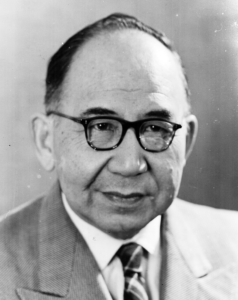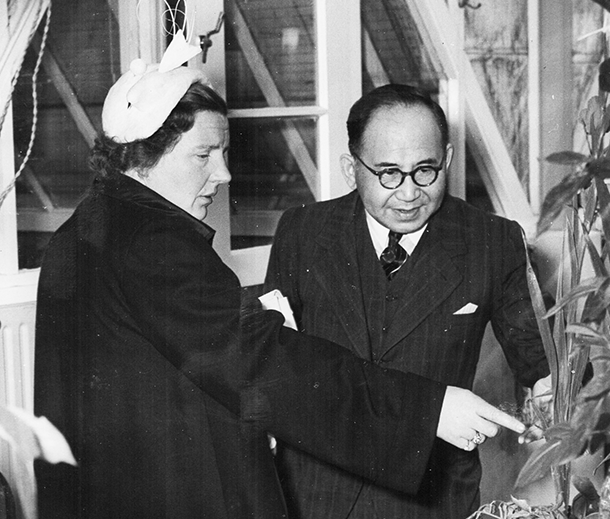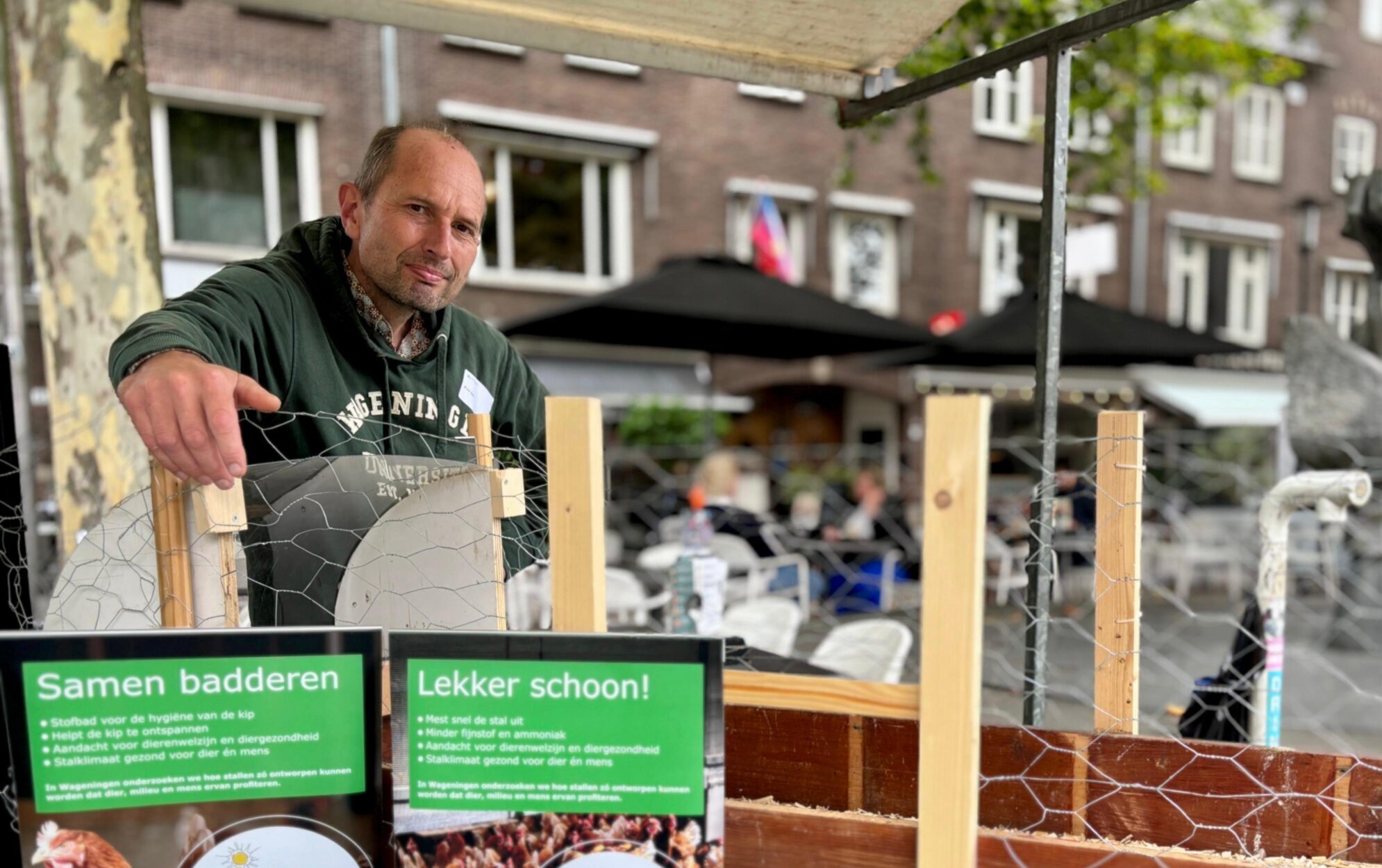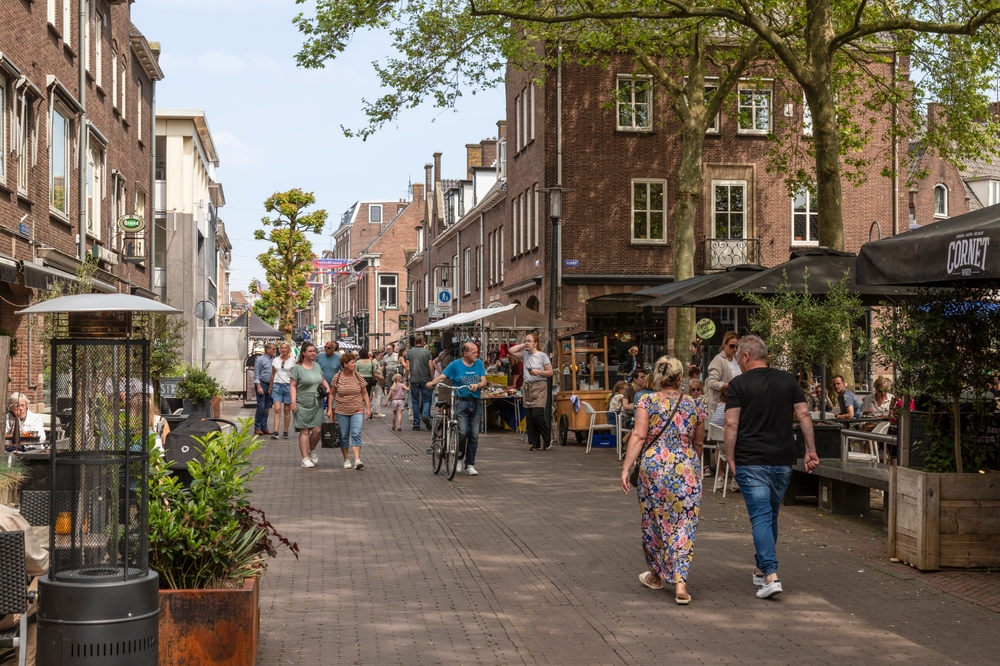The eldest son of a Chinese-Indonesian businessman became the world’s first professor of Virology. His biographer Frans Glissenaar talks about how that happened.
‘‘As far as I know, Holland now leads the world in being the first country to elect a professor exclusively for viruses,’ said the British plant diseases expert and virologist Sir Frederick Bawden in 1950. The professor of Virology was Hiang Tjeng Thung, and the occasion was his inauguration in Wageningen, a frontrunner in virus research at the time. Which was thanks to Thung, a Chinese-Indonesian researcher who is hardly remembered here now.
But Thung has recently been rescued from oblivion with the publication by freelance journalist Frans Glissenaar of a hefty tome about his life and work: Tussen de vier zeeën (Between the four seas). The book’s subtitle is The life of Thung Tjeng Hiang (1897-1960), with the family name first, in line with Chinese custom.This is the first biography of a Wageningen scientist, so the Special Collections department of the library is dedicating an exhibition to Thung. WUR was given Thung’s archive this summer: 10 boxes full of letters and documents, a goldmine that Glissenaar has studied exhaustively over the past few years.
Wageningen
The idea of a biography came from the professor’s descendants, says Glissenaar. He was approached in the autumn of 2019 by Thung’s daughter Mady Thung (96). At that point, Glissenaar had never heard of the once eminent virologist. But there’s a reason why Thung’s daughter knocked at his door. ‘I’ve written several books about the Dutch East Indies, including a biography of Ernest Douwes Dekker, a great-nephew of the famous Dutch author Multatuli, who played a key role in the nationalist movement in the Dutch East Indies. Initially, Mady’s older brother Paul, a professor at Leiden, was going to write the biography. ‘But he didn’t manage. Paul, who had his father’s archive, died in 2016.’
Glissenaar did not have time for the task immediately, but saw at once that Thung was a fascinating figure. ‘Mady had told me a bit about who her father was and what he had done. I was intrigued by the fact that he was of Chinese origin, and had moved to the Netherlands and married a Dutch woman.
He did his own research on how tobacco viruses work
At that point I had no idea that he had worked in Wageningen.’ A few months later, when Covid-19 broke out, the fact that Thung was a virologist made the job even more interesting. And there was no lack of material. ‘Thung kept all his correspondence, not only with his family but also with all the scientists he was in touch with. I think he rarely if ever threw out a letter, and he also kept a lot of copies of letters he sent himself.’
Overseas
Hiang Tjeng Thung was born on West Java in 1897. He came from a well-to-do Chinese family that had been living on West Java for generations. His father was the youngest in a family of nine boys, and had a rice mill and a tea plantation. ‘Many of his uncles were rich and prominent Chinese businessmen,’ says Glissenaar. In 1916, Thung was sent to Wageningen to study agriculture at the National College of Agriculture, Horticulture and Forestry, the forerunner of today’s Wageningen University. Studying overseas was expensive. ‘His father couldn’t finance it alone. That’s why his uncles chipped in.’ This is a recurring pattern, says Glissenaar. ‘Thung often ran out of money throughout his life. He was a big spender and was constantly asking his family for more money.’ According to Glissenaar, that affected his relationships with his brothers and sisters.
Thung had incredibly good social skills
‘They thought he’d been sent to the Netherlands for the sake of the family and would come back later to help them. But that never happened. He did work for the tobacco plantations in the Dutch East Indies for a long time, but in a different area, not where his family lived. He got away with that because his uncles took him under their wing. They could see that he was clever and had a big network at several levels, which was useful for them.’
Thung completed his Wageningen degree in phases, with intervals in between. In his third year he took time off to study Philosophy and Sinology in Leiden, where he became overworked. To rest and recover, he went to stay in Gennep, in Limburg with the family of a pastor who knew one of Thung’s teachers in Leiden, and whose wife Fernanda was the daughter of a plantation manager in the Dutch East Indies. The couple had two young children, but it wasn’t a happy marriage, says Glissenaar. By contrast, Hiang and Fernanda got on very well and fell in love. ‘She then got a divorce, which was a major drama of course, particularly in those days. And her children were taken away from her by court order. She didn’t see them for a long time, although that worked out okay in the end.’ Thung took up his agricultural studies again after a few diversions, and graduated in 1925 from the Agricultural College, nine years after first arriving in Wageningen.
His pallbearers were representatives of all the Wageningen student societies
Now married to Fernanda, he got a job as an assistant in the newly established Institute for Mycology and Potato Research at the Binnenhaven, led by Professor of Plant Pathology Hendrik Quanjer. With Quanjer as his supervisor, Thung got his PhD (with distinction) three years later for a groundbreaking study of the potato leafroll virus.
Postcards
His PhD research created the basis for Thung’s career as a virologist, which progressed further in the Dutch East Indies at the Royal Dutch Tobacco testing station and the Institute for Plant Diseases in Buitenzorg (now Bogor). Glissenaar: ‘He did a lot of research on tobacco viruses. Of course it was largely geared to combating and preventing viral diseases, but he also did his own research on how those viruses work. He corresponded about that with virologists elsewhere, particularly in England. That gave him a big international network.’
After World War II, Thung was briefly professor of Agriculture at the new University of Indonesia, before he was invited to the Netherlands to lead the Virology department of the planned new Institute for Plant Pathological Research (IPO) in Wageningen. The job came with an Extraordinary Professorship in Virology at the Agricultural College, the pioneering appointment in 1950 with which this article began.
Six years later, Thung’s ‘extraordinary’ position was exchanged for a chair-holding professorship and Virology became a degree subject in its own right at the Agricultural College. He no longer had much time for his own research, and was now primarily a manager and an organizer. ‘He travelled a lot around the world, and lots of scientists came to Wageningen from other countries for varying lengths of time.
Thung kept all his correspondence. Not just with his own family, but also with all the scientists he was in touch with
There was a lot of exchange. The lab in Wageningen was highly regarded, as was Thung himself. It helped that he had very strong social skills. An American virologist who wanted to travel around Europe after doing some work in Wageningen found a postcard from Thung is every hotel room he stayed in. That was the kind of thing he did, and of course it was much appreciated. Everyone who knew him was crazy about the man. He liked a joke and messing around, and enjoyed socializing and excursions. He was good at all that.’
Cigars
Thung only led his chair group for four years. He died of a heart attack in November 1960. ‘He had had a weak heart for a while,’ says Glissenaar. ‘He was a heavy smoker. A Chinese doctor friend of his wrote to him regularly to tell him to stop smoking, but he took no notice. And it wasn’t easy of course: he was part of the tobacco lobby. He was involved in the tobacco industry’s very first conference in Amsterdam. Whenever he visited foreign associates, he took them a box of Dutch cigars.’
Thung’s popularity was reflected in the two-kilometre-long funeral cortege when he was buried in Wageningen. His pallbearers were representatives of all the Wageningen student societies. All the papers reported his death and his wife Fernanda received hundreds of messages of condolence from all around the world. But he nevertheless got forgotten with the passing of the years. Now Glissenaar’s book and the library’s exhibition are finally doing him justice.

Tussen de vier zeeën. Het leven van Thung Tjeng Hiang (1897-1960).
Frans Glissenaar |Uitgeverij Verloren, Hilversum | 29 euros | ISBN 9789464550931
Fascinating Viruses | Special Collections Exhibition | Forum Library

 Visit of Queen Juliana to the Institute for Phytopathology on the occasion of 75 years of
National Agricultural Education in September 1951.
Visit of Queen Juliana to the Institute for Phytopathology on the occasion of 75 years of
National Agricultural Education in September 1951. 

